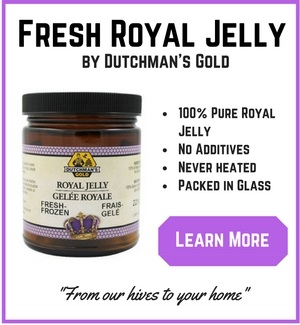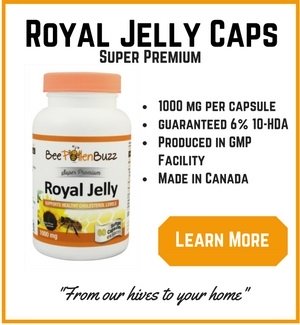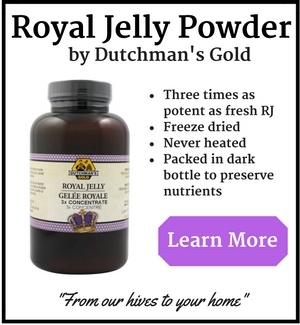Does Royal Jelly Improve Fertility?

Long regarded as a hormonal tonic and fertility aid, royal jelly is used by millions around the world. Does it improve fertility rates? Let's dig into the studies and history of this superfood from the hive and answer this question once and for all.

by Angela Ysseldyk, Nutritionist and Beekeeper's Daughter
Getting pregnant is becoming harder and harder. In 1984, the estimated percentage of couples with fertility problems was 5.4%. In 1992, this number increased to 8.5%. And today, the estimated prevalence (total number of couples with infertility) is up to 15.7%. As a result, I get asked about using royal jelly to boost fertility on a frequent basis.
The following animal study on Royal Jelly suggests the fertility boosting effects of Royal Jelly:
- Henry Hale fed lab rates Royal Jelly and documented increased ovarian activity within a few days and an increase in fertility. He also demonstrated that royal jelly has hormone like activity that stimulates improved growth of the ovaries in rats within a few days.
- Hale also injected the extract of royal jelly into female rats and found that it stimulated the ovarian growth in the same manner. It was also found that fruit flies grew faster and laid eggs at a faster rate than usual by 60%.
Royal Jelly Improves Pregnancy Rates
Another study suggesting royal jelly positively impacts fertility rates was conducted at the Jordan University of Science and Technology. The researchers wanted to determine whether natural royal jelly in conjunction with progesterone cream is associated with improved reproductive responses in sheep.
Thirty 3 - 6 year old female sheep were randomly allocated into three groups of 10 each. They were then bred with male sheep and tested to determine ovulation times as well as pregnancy rates.
Upon completion of the study, the scientists concluded that the results demonstrated both Royal Jelly treatments in conjunction with progesterone improved pregnancy rates.
It is also said that the fatty acids found in royal jelly are effective towards autonomic imbalance, peri-menopausal symptoms, osteoporosis, and other conditions. These effects may be due to the interaction of the fatty acids of royal jelly with an estrogen receptor inside the human body.
Royal Jelly: Endocrine and Hormone Balance
Royal jelly has favorable effects on the hypothalamic-pituitary axis which generally declines with aging. The HPA axis is a major part of the neuro-endocrine system that controls reactions to stress and regulates many body processes, including digestion, the immune system, mood and emotions, sexuality and energy storage and expenditure. Too much stress turns this function off and stress can come in many forms. Royal Jelly may help this axis to work better therefore regulating the functions and associated hormones.
According to another animal study, Royal jelly can compensate for age-associated decline in pituitary functions. The pituitary gland is part of the endocrine system and produces hormones which control other glands as well as various bodily functions.
The Pituitary Gland is the master conductor of our hormones. The Hypothalamus and Pituitary Glands will affect all hormones, specially the feel good hormones, your sleep hormones and sex hormones. You will not feel particularly well if these hormones are not in order and you may have difficulty getting pregnant. Stress turns it 'of'f, so low pituitary function is common in those who are constantly busy, stressed, have Post Traumatic Stress disorder or are over-trained.
The Pituitary Gland also helps:
- Govern reproduction
- Produces and secretes hormones that regulate the adrenal and thyroid glands, ovaries and testes
- Generates prolactin, which enables new mothers to produce milk.
- Releases a hormone which stimulates the melanocytes, cells which control pigmentation through the production of melanin.
- Produce an antidiuretic hormone, which reclaims water from the kidneys and conserves it in the bloodstream to prevent dehydration.
- Oxytocin is also produced by the pituitary, aiding in uterine contraction during childbirth and stimulating the production of milk.
Royal Jelly and Estrogenic Activity?
A very common question I receive is whether Royal Jelly has estrogenic action. There is not a clear answer to this but we do know that royal jelly will lock itself onto the 17-beta Estradiol receptor in vitro. This suggests that it may act as a phytoestrogen. If this is the case, we do not recommend Royal Jelly if you have had estrogen receptor positive breast cancer. More research is definitely needed in this area.
In another study, royal jelly demonstrated competition with 17 beta-estradiol for binding to the human estrogen receptors alpha and beta and provides evidence that it has estrogenic activity through interaction with estrogen receptors followed by endogenous gene expressions.
Those who are estrogen deficient may benefit from this. Again, I would caution those who have had estrogen receptor positive breast cancer because we still are not sure the mechanism of action of royal jelly having an estrogenic effect.
How much Royal Jelly to take for Hormone Balance
When trying to get pregnant my recommendation is to:
- Take 3000 mg per day of Royal Jelly (but not on your period) along with 2 capsules per day of a supplement called EstroSmart Plus. This combination will stimulate your ovaries to ovulate properly, get progesterone 'into gear' and regulate your cycle.
Once you become pregnant you should stop taking both royal jelly and EstroSmart Plus and switch to Estrosmart (the non-Plus version).
I suggest the following when using Royal Jelly in therapeutic dosages.
- Day one of your cycle is the first day of your period, and you want to take Royal Jelly during your cycle, but not while menstruating.
- The first day after your period (likely around day 4-7) take 1000 mg split into 2-3 dosages (total 3000 mg) until the first day of your period, likely around day 28-32.
- Daily maintenance dosage of 500-1000 mg per day is safe and recommended.
Note: Do not use more than 5000 mg / day of royal jelly.
Takeaways
Royal Jelly has hormonal activity in the body along with many other health benefits. While no human studies have been completed on fertility rates, several animal studies have been done and the results were positive. The long term safety record of royal jelly combined with the relative affordability of this superfood compared to IVF suggest that it should be considered for use by anyone looking to increase their odds of conceiving naturally.
Read Next: Boost Sperm Count & Testosterone With Royal Jelly
Explore More Health Benefits of Royal Jelly:
†These statements have not been evaluated by the Food and Drug Administration. This product is not intended to diagnose, treat, cure or prevent any disease.
References:
A Theoretical Insight into the Interaction of Fatty Acids Involved in Royal Jelly with the Human Estrogen Receptor: Toshiaki Matsubara1), Hiroyuki Sugimoto2) and Misako Aida1, 1) Center for Quantum Life Sciences and Graduate School of Science, Hiroshima University 2) Yamada Apiculture Center, Inc.
Royal jelly has estrogenic effects in vitro and in vivo. Mishima S, Suzuki KM, et al., J Ethnopharmacol. 2005 Oct 3;101(1-3):215-20
|
|
|








New! Comments
Do you have something to say about what you just read! Leave me a comment in the box below. I'd love to hear from you!